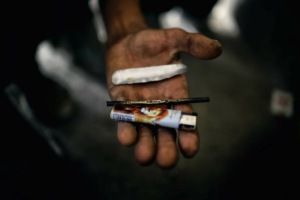News
Telling the Danish government that illegal drug trade is playing into the hands of the criminals
This article is more than 8 years old.
For ten minutes tomorrow, Neil Woods, a former undercover British policeman, will address a parliamentary hearing about how legalislation could change crime forever … but will they listen?

It’s a grim business (photo: Jordi Bernabeu Farrús)
One of the cornerstone arguments of the movement to legalise cannabis – which would appear to have the backing of many of Denmark’s municipalities, but not its government – is that it will be one of the most effective ways to neutralise criminals who derive a large part of their income from this trade.
READ MORE: Copenhagen again pushing towards legalising cannabis
Neil Woods, a British policeman who spent 14 years undercover infiltrating drug gangs, is a major advocate of legalising not just cannabis, but most drugs, and tomorrow (October 25) he will be making a ten-minute presentation on the subject during a parliamentary hearing at Christiansborg.
Yes, that’s correct, he’s got just 10 minutes! Fortunately the charity Gadejuristen is giving him much more time at an event starting at 16:30 at the H15 Scene (Halmtorvet 15, Cph V).
‘Stop krigen mod narkotika!’ is in English and free to attend. Find out more details via Facebook.
Experienced undercover operative posing as an addict
Woods, the chair of the British chapter of LEAP (Law Enforcement Against Prohibition), recently released a book detailing his experience, ‘Good Cop, Bad War’.
For a condensed version, check out the Guardian article ‘I’ve done really bad things’, in which he reveals how he had an epiphany whilst working as an undercover policeman acquiring evidence of drug offences that led to prison sentences totalling over 1,000 years behind bars.
For 14 years, Woods would leave for work every day dressed in “charity-shop scally tracksuit bottoms”, according to the Guardian, and turn up in a UK town posing as a drug addict.
He would then “befriend destitute addicts, ingratiate himself with their dealers, buy drugs from them – and then have the whole lot sent to jail”.
Gang-rape, murder, intimidation
However, as gangs wised up to the police’s tactics, suspicion grew. Informants weren’t just putting themselves at risk, but also their girlfriends or female relations, who could be gang-raped as a result.
“The gangsters’ most effective way of fighting back is upping the use of fear and intimidation against potential informants. In other words, they were getting nastier and nastier as a direct result of what I was doing,” Woods explained.
Woods often wondered why heroin fatalities in Brighton were five times the national average – until he learnt that dealers administered overdoses to addicts they suspected of being informants.
On numerous occasions Woods was nearly exposed and even killed, and despite the success, it was beginning to take its toll on his mental state. An eventual diagnosis confirmed he had PTSD.
“It’s not criminals that cause crime, it’s opportunity,” contended Woods.
And the stats are compelling. Some 50 percent of all inmates in Britain have been convicted of drug-related crimes. And 50 percent of all acquisitive crime is committed by less than 0.2 percent of the population – namely problematic heroin users.










































